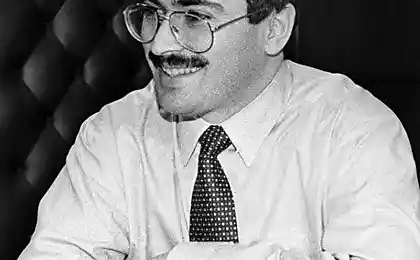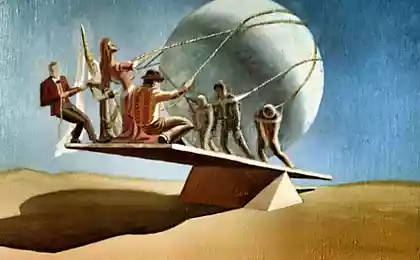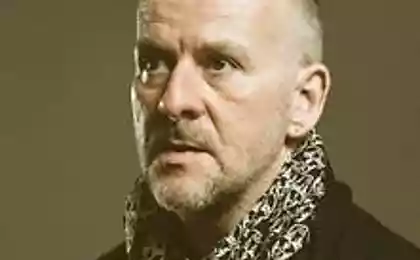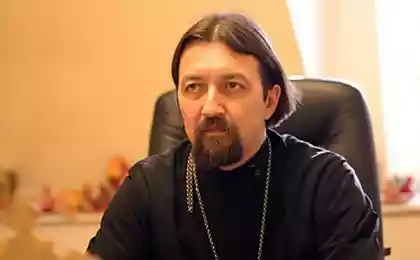736
Andrei Zorin about the traumas of the past and political manipulation
Seventy two million three hundred one thousand five hundred fifteen
"We have because of Ivan the terrible, people can fight" Andrei Zorin about the traumas of the past and political manipulations Oxford University and Ranepa, expert in the field of history of Russian culture and intellectual history Andrei Zorin has recently performed in Moscow and St. Petersburg in the framework of joint lectures Esquire and InLiberty. The Professor spoke about how to protect the history of political speculation, why many are still concerned about whether the rights of Peter the great, and what sources our descendants will study our lives. — The recent political events have shown us how easy it is to manipulate history to create phantoms and to speculate on them. How can I deal with this — or is this unavoidable fact: history and politics will always be inextricably linked?
— It is impossible to imagine a story that would not have influenced policy. I had a chance to talk about it: it's always bad and often criminal, but there is no other way — as there is no society in which there would be no crime. Politics corrupts history — and the political use of history in the vast majority of cases serves to strengthen hatred and aggression. How to deal with it — I have no answer to this question. On a personal level, the level of the individual historian, these technologies understandable. At the group level are representable, though difficult to achieve. What can be done at the national level, I don't know: to convince politicians that history has no immediate political component, that it all about something else, most likely, useless. And hope that there will be historians, always ready to eat, more naive back then.
— Then what should be a healthy mix of history and politics? Are there examples of countries, where everything is arranged more reasonable?
It would be nice to keep them from each other further. It would be good if politicians understood that history to appeal is not that it is not allowed rhetorical technique. But no such examples — and there are politicians I have not seen: the history of appealing everything, always and in all cases. There are countries where all this happens quietly, without pathos, so recently during the referendum on Scottish independence, both sides, thank God, talked less about the past than about the future, i.e. about the relative benefits and challenges of living after separation. In General, the more prosperous the country is, the easier it is for citizens it's the way life is, the less the need for mass mobilization on historical examples.
— That is, the less the need to legitimize their behavior through history?
Pool historical facts is an important means of community and national mobilization. "We shed blood, it is our history, it is the land where our ancestors lived and so on" is a very powerful emotional resource. The need for this kind of mobilization indicates that the routine mechanisms of social control are not working, need some extreme techniques and strong passions.
— What then is the task of the historian and how the historian can behave under the circumstances?
— To maintain sobriety and common sense, to carry out their work. Many historians are tempted to become politicians, historians think that knowledge of history gives them this for some reason. As a rule, the policy of the historians fail, sometimes just awful. To believe that knowledge of history can be directly applied in practice, it means to give in to temptation: the story is about something that already ended.
Seventy six million nine hundred seventy three thousand nine hundred sixty eight
inliberty.ru
— What should be the place of history in the system of philosophies of society?
— Like any other field of knowledge, history is useful when working on the complication of the world picture. The more complex the reality it describes, the more diverse and complex factors it may take into account — the more you can make her useful insights for today and for human life. The easier a person to navigate the new complexities. In contrast, a simplification of reality to the most primitive models is a guarantee that specific people and groups of people who profess to condemn you to terrible trouble. If history can complicate the picture of the world, she is able partly to help some people and groups of people these troubles to avoid.
— Do you think that history is a serious force in terms of the impact on people?
— I wish this power was smaller. I happened to speak of it this way: in Latin America in the time of military coups was the slogan: "Military in barracks". By analogy with this I formulated a slogan: "Historians in the Department" where they could engage in their professional business and not try to control others or to influence those who govern.
"In General, the more prosperous the country is, the easier it is for citizens it's the way life is, the less the need for mass mobilization on historical examples»
— You once said that history should be the basis of any education. It is for these reasons?
— Yes, because the ability to see themselves in the historical dynamics, understand that everything flows and changes, is one of the most important for each person. That the world in which you live is not always and will not always like you see it. The English poet Thomas Eliot, who wrote about the seventeenth century in England, was such a wonderful phrase: "Like any other era, this era was a transition." It is useful to understand this because it is human nature to naturreservat a picture of the world to believe that it is natural and common to all. On the other hand, a person has the opposite temptation: to exaggerate its uniqueness. It is a common misconception, but as they said in Joseph Brodsky's poem "is Devoted to Yalta", — "While we think we are unique, we do not know." The story helps this illusion to be overcome — we see that although many things change, we are in principle repeatable in other circumstances, we are solving problems similar to those that have successfully or unsuccessfully solved by our ancestors.
— You feel like changing up the story today in the light of klipovoy consciousness, new sources, new technologies? Digital history and the democratization of history is already a reality?
Is, of course, the reality — but not all have time for a change, and I, in particular, for them is not very time. Have the opportunity to work with incredibly enlarged number of facts and sources, and the historian of our generation has great prospects, which our predecessors were not. As for democratization, it's really happening — and it's an interesting process — history ceases to be owned by a particular professional caste. It is a challenge for professionals. Snobbish reaction probably would not be the most reasonable.
But this is a complex challenge — and the first reaction seems to be inevitable to be snobbish.
— One of the experts in public history — British historian Jerome de GRU — told me that once sat in the library and wrote a thesis about the history of the English revolution of the seventeenth century. He went outside and saw the carnage: people in costumes of the time portrayed roundheads and Cavaliers fought it out with weapons in hand. Then he thought: its the way to understand history is more privileged in relation to the activities of these people? He sits and reads — and people play, trying to bodily experience, felt that the heroes of any era.
— How to be then with the criterion of historical knowledge and whether it is possible in principle to use "real knowledge" in relation to history?
Yuri Lotman said that the person dealing with the biography of the figure of the past, perhaps can not know all that he knew this figure, but can and must aspire to. But why would he useless endeavor — is to forget everything this man did not know. If I'm writing a book about Pushkin, Tolstoy or Peter the great, I can't get out of my head everything that was not in their consciousness — for obvious reasons. It is a natural response to your question — I can understand the past only on the basis of their position.
Thirty six million seven hundred fourteen thousand eight hundred thirty eight
inliberty.ru
The question of criteria — very complex: for digital history might have criteria associated with huge amounts of data. But, most likely, and such studies involve the interpretation, so it still is not about proof, but about credibility. One or the other interpretation convinces us. Of course, there are correct procedures for working with the material, the rules of scientific or professional hygiene — just as you need to brush your teeth, you need to follow these rules. But there is little that can definitively prove, basically, to be only more or less convincing.
— How to be with all the Amateur historians — which, because of the democratization of history will appear in the in greater numbers?
— The man who wears the costume of the seventeenth century, is an Amateur historian and it is quite right to exist. I can criticize him just because he wore the wrong costume, though, as a rule, people who do this, know the facts and details right. If the person conducted research on the history of his family, he is a unique professional in this field, and no professional historian can't with him in this match. But if a person comes in the field of professional history, it is useful to know the professional rules and procedures, otherwise it is likely to disgrace himself. I have no objections no objections mass history to the extent in which it meets its objectives and possibilities. But if you're going to engage in historical study, you need a certain amount of knowledge and ideas about how to do it and how it is done.
— You can imagine what would be considered a source in the future? If we analyze data, SMS, media screens? Or as science fiction?
Is a very good question and I'd like to know the answer. Today there is an incredible abundance of textual information, it is very difficult to treat, although there are new methods. Obviously, such information is ephemeral, we do not know what will be available to the historian in 25 years where 25 years will have all these text messages? Change systems, people, programs, methods of digitization. Paper of the seventeenth century lies and is currently, if you digitize is great, the information became available — but in five years, as a rule, it turns out that you need to do it again. What will become material for historical research and what is not is a complicated question. Another thing is that the traditional metaphor of historical research and the word "source" I regard with some skepticism — as said by Peter Burke (British cultural historian and Medievalist. — Primas'. T&P), history leaves no sources, it leaves traces.
— I would like to talk to you a little more about Russia. In an interview with an American journalist — and this thought seems to have been somewhere Pelevin — mentioned specifics of the historical memory in Russia: that is not one event doesn't end for real, and we do that ride in a circle on the carousel along with the ghosts of the past. Do you agree with this?
— I am skeptical of such global judgments. That means that no process ends? If we are seriously discussing this thesis, we need to define the criterion of completeness of the historical process. Ended the process of the abolition of slavery in the United States? If so, when — with the Civil war, desegregation in 1964, the election of the first black President or is he still out there? There is a phrase attributed to Zhou Anelay who was asked about the historical significance of the French revolution, he said that it is too early to talk about it. So that means that the historical process is not finished?
"There is nothing typically Russian to sort things out with long-gone ancestors. But I would probably have agreed that we are more nervous than in many other places»
It has the following in mind: we are still discussing, how was Ivan the terrible. Correctly done Peter? We have no basic consensus about what happened many centuries ago.
— Consensus on this issue, apparently, and can't be. What we are discussing, properly behaved Peter the great, — this applies to what I said at the beginning: we do not understand that history is ended, and ended many centuries ago. Peter is long dead and it's time to stop discussing whether he was acting correctly or not. Interesting to see what he was doing, what his motives were. What were the consequences of his policies, and so on. And the question of right or wrong, is irrelevant: we are not judges, even the neighbor we don't judge, why should we judge of the Emperor, who died almost three hundred years ago.
Is a sort of domestic hell?
There is nothing typically Russian to sort things out with long-gone ancestors. But I would probably have agreed that we are more nervous than in many other places. Cromwell during the restoration of dug up from the grave and cut off his head — but now after visiting the exhibition in the house of Cromwell you proposed to assess his work. The discussion continues, but its form, and graduis this is greatly reduced. This Museum will not be each other to kill those who think of Cromwell as a great revolutionary, and those who consider him a great villain who destroyed the good old England. This model amortizes the aggression — and Nazis–for Peter the great and Ivan the terrible, people can fight. I myself, however, because of the more recent examples fall into a terrible Paphos — certainly, for me, there are historical facts and names, causing such hysterical excitement.
Due to the fact that we had such a traumatic twentieth century?
— Certainly. It's still in memory — family, people, living history. It's not ending on time — we have seen and remember the people who in this century lived.
One million four hundred twenty four thousand nine hundred seventy eight
inliberty.ru
— Do you think time will cure and will help process the trauma?
— If about Ivan the terrible is still a debate raging, that time will not heal but will probably be quieter. I don't know technology historical relaxation, in addition to translations in a neutral academic register, in play, in exercise. People who beat each other up with swords in the costumes of Cavaliers and puritans, and then having a beer together.
— In your interview on "PostNuke" you talked about the two Russian revolutions — 1917 and 1991. To admit of the latter, I never thought about the revolution — including due to the fact that, as you rightly pointed out, this event is quite different is presented to us.
— You know, if you count the standard revolution of 1917, it all pales a little blood was less incomparable, although we still don't know the historical process is not yet over, blood continues to flow. The revolution of 1991 was, of course, less horrible and bloody than the civil war and terror. But it seems to me that when the result of such a disaster the country changes borders, political system and the name — it is called a revolution. There is a wonderful monograph by Vladimir Mau and Irina Starodubrovsky "Great revolutions from Cromwell to Putin". There they described the cycle of world historical revolutions — what is the principle of the great revolution, how it differs from the revolution of another type, for example, us. The latter was also ambitious in its consequences, but in fact it was a revolt in the Imperial province and its separation from the mother country.
— How would you describe contemporary historical consciousness in Russia (in the preview of your lecture sounded such characteristics as historical determinism, conspiracy theory, national unity and, of course, a value-absorbing fear of the authorities)?
— It is sad. On the one hand, people fatally believe in nothing and know what all of the hype. We live in an era of triumphal March of modernism, because everyone knows that everything is wrong. On the other hand, this total distrust breeds wild give crazy ghosts, conspiracy theories and generally any delirium. I recently read that 45% of our population believes that there is a world government. What kind of historical consciousness thus we can say?
— Probably not quite correct to refer to the historian for predictions, but still: what do you think Russia should expect from the future?
— Never know. The best way to predict the future, I have, it does not exist in history. The dynamics depends on a huge number of factors that cannot be predicted in advance, and I love that it is also impossible to foresee. As a simple man, not as a historian, I do not expect anything good — my intuitive sense of the situation is rather pessimistic on how it is accepted to speak, a short-term period. On the other hand, I sincerely want to make a mistake.
Source: theoryandpractice.ru
"We have because of Ivan the terrible, people can fight" Andrei Zorin about the traumas of the past and political manipulations Oxford University and Ranepa, expert in the field of history of Russian culture and intellectual history Andrei Zorin has recently performed in Moscow and St. Petersburg in the framework of joint lectures Esquire and InLiberty. The Professor spoke about how to protect the history of political speculation, why many are still concerned about whether the rights of Peter the great, and what sources our descendants will study our lives. — The recent political events have shown us how easy it is to manipulate history to create phantoms and to speculate on them. How can I deal with this — or is this unavoidable fact: history and politics will always be inextricably linked?
— It is impossible to imagine a story that would not have influenced policy. I had a chance to talk about it: it's always bad and often criminal, but there is no other way — as there is no society in which there would be no crime. Politics corrupts history — and the political use of history in the vast majority of cases serves to strengthen hatred and aggression. How to deal with it — I have no answer to this question. On a personal level, the level of the individual historian, these technologies understandable. At the group level are representable, though difficult to achieve. What can be done at the national level, I don't know: to convince politicians that history has no immediate political component, that it all about something else, most likely, useless. And hope that there will be historians, always ready to eat, more naive back then.
— Then what should be a healthy mix of history and politics? Are there examples of countries, where everything is arranged more reasonable?
It would be nice to keep them from each other further. It would be good if politicians understood that history to appeal is not that it is not allowed rhetorical technique. But no such examples — and there are politicians I have not seen: the history of appealing everything, always and in all cases. There are countries where all this happens quietly, without pathos, so recently during the referendum on Scottish independence, both sides, thank God, talked less about the past than about the future, i.e. about the relative benefits and challenges of living after separation. In General, the more prosperous the country is, the easier it is for citizens it's the way life is, the less the need for mass mobilization on historical examples.
— That is, the less the need to legitimize their behavior through history?
Pool historical facts is an important means of community and national mobilization. "We shed blood, it is our history, it is the land where our ancestors lived and so on" is a very powerful emotional resource. The need for this kind of mobilization indicates that the routine mechanisms of social control are not working, need some extreme techniques and strong passions.
— What then is the task of the historian and how the historian can behave under the circumstances?
— To maintain sobriety and common sense, to carry out their work. Many historians are tempted to become politicians, historians think that knowledge of history gives them this for some reason. As a rule, the policy of the historians fail, sometimes just awful. To believe that knowledge of history can be directly applied in practice, it means to give in to temptation: the story is about something that already ended.
Seventy six million nine hundred seventy three thousand nine hundred sixty eight
inliberty.ru
— What should be the place of history in the system of philosophies of society?
— Like any other field of knowledge, history is useful when working on the complication of the world picture. The more complex the reality it describes, the more diverse and complex factors it may take into account — the more you can make her useful insights for today and for human life. The easier a person to navigate the new complexities. In contrast, a simplification of reality to the most primitive models is a guarantee that specific people and groups of people who profess to condemn you to terrible trouble. If history can complicate the picture of the world, she is able partly to help some people and groups of people these troubles to avoid.
— Do you think that history is a serious force in terms of the impact on people?
— I wish this power was smaller. I happened to speak of it this way: in Latin America in the time of military coups was the slogan: "Military in barracks". By analogy with this I formulated a slogan: "Historians in the Department" where they could engage in their professional business and not try to control others or to influence those who govern.
"In General, the more prosperous the country is, the easier it is for citizens it's the way life is, the less the need for mass mobilization on historical examples»
— You once said that history should be the basis of any education. It is for these reasons?
— Yes, because the ability to see themselves in the historical dynamics, understand that everything flows and changes, is one of the most important for each person. That the world in which you live is not always and will not always like you see it. The English poet Thomas Eliot, who wrote about the seventeenth century in England, was such a wonderful phrase: "Like any other era, this era was a transition." It is useful to understand this because it is human nature to naturreservat a picture of the world to believe that it is natural and common to all. On the other hand, a person has the opposite temptation: to exaggerate its uniqueness. It is a common misconception, but as they said in Joseph Brodsky's poem "is Devoted to Yalta", — "While we think we are unique, we do not know." The story helps this illusion to be overcome — we see that although many things change, we are in principle repeatable in other circumstances, we are solving problems similar to those that have successfully or unsuccessfully solved by our ancestors.
— You feel like changing up the story today in the light of klipovoy consciousness, new sources, new technologies? Digital history and the democratization of history is already a reality?
Is, of course, the reality — but not all have time for a change, and I, in particular, for them is not very time. Have the opportunity to work with incredibly enlarged number of facts and sources, and the historian of our generation has great prospects, which our predecessors were not. As for democratization, it's really happening — and it's an interesting process — history ceases to be owned by a particular professional caste. It is a challenge for professionals. Snobbish reaction probably would not be the most reasonable.
But this is a complex challenge — and the first reaction seems to be inevitable to be snobbish.
— One of the experts in public history — British historian Jerome de GRU — told me that once sat in the library and wrote a thesis about the history of the English revolution of the seventeenth century. He went outside and saw the carnage: people in costumes of the time portrayed roundheads and Cavaliers fought it out with weapons in hand. Then he thought: its the way to understand history is more privileged in relation to the activities of these people? He sits and reads — and people play, trying to bodily experience, felt that the heroes of any era.
— How to be then with the criterion of historical knowledge and whether it is possible in principle to use "real knowledge" in relation to history?
Yuri Lotman said that the person dealing with the biography of the figure of the past, perhaps can not know all that he knew this figure, but can and must aspire to. But why would he useless endeavor — is to forget everything this man did not know. If I'm writing a book about Pushkin, Tolstoy or Peter the great, I can't get out of my head everything that was not in their consciousness — for obvious reasons. It is a natural response to your question — I can understand the past only on the basis of their position.
Thirty six million seven hundred fourteen thousand eight hundred thirty eight
inliberty.ru
The question of criteria — very complex: for digital history might have criteria associated with huge amounts of data. But, most likely, and such studies involve the interpretation, so it still is not about proof, but about credibility. One or the other interpretation convinces us. Of course, there are correct procedures for working with the material, the rules of scientific or professional hygiene — just as you need to brush your teeth, you need to follow these rules. But there is little that can definitively prove, basically, to be only more or less convincing.
— How to be with all the Amateur historians — which, because of the democratization of history will appear in the in greater numbers?
— The man who wears the costume of the seventeenth century, is an Amateur historian and it is quite right to exist. I can criticize him just because he wore the wrong costume, though, as a rule, people who do this, know the facts and details right. If the person conducted research on the history of his family, he is a unique professional in this field, and no professional historian can't with him in this match. But if a person comes in the field of professional history, it is useful to know the professional rules and procedures, otherwise it is likely to disgrace himself. I have no objections no objections mass history to the extent in which it meets its objectives and possibilities. But if you're going to engage in historical study, you need a certain amount of knowledge and ideas about how to do it and how it is done.
— You can imagine what would be considered a source in the future? If we analyze data, SMS, media screens? Or as science fiction?
Is a very good question and I'd like to know the answer. Today there is an incredible abundance of textual information, it is very difficult to treat, although there are new methods. Obviously, such information is ephemeral, we do not know what will be available to the historian in 25 years where 25 years will have all these text messages? Change systems, people, programs, methods of digitization. Paper of the seventeenth century lies and is currently, if you digitize is great, the information became available — but in five years, as a rule, it turns out that you need to do it again. What will become material for historical research and what is not is a complicated question. Another thing is that the traditional metaphor of historical research and the word "source" I regard with some skepticism — as said by Peter Burke (British cultural historian and Medievalist. — Primas'. T&P), history leaves no sources, it leaves traces.
— I would like to talk to you a little more about Russia. In an interview with an American journalist — and this thought seems to have been somewhere Pelevin — mentioned specifics of the historical memory in Russia: that is not one event doesn't end for real, and we do that ride in a circle on the carousel along with the ghosts of the past. Do you agree with this?
— I am skeptical of such global judgments. That means that no process ends? If we are seriously discussing this thesis, we need to define the criterion of completeness of the historical process. Ended the process of the abolition of slavery in the United States? If so, when — with the Civil war, desegregation in 1964, the election of the first black President or is he still out there? There is a phrase attributed to Zhou Anelay who was asked about the historical significance of the French revolution, he said that it is too early to talk about it. So that means that the historical process is not finished?
"There is nothing typically Russian to sort things out with long-gone ancestors. But I would probably have agreed that we are more nervous than in many other places»
It has the following in mind: we are still discussing, how was Ivan the terrible. Correctly done Peter? We have no basic consensus about what happened many centuries ago.
— Consensus on this issue, apparently, and can't be. What we are discussing, properly behaved Peter the great, — this applies to what I said at the beginning: we do not understand that history is ended, and ended many centuries ago. Peter is long dead and it's time to stop discussing whether he was acting correctly or not. Interesting to see what he was doing, what his motives were. What were the consequences of his policies, and so on. And the question of right or wrong, is irrelevant: we are not judges, even the neighbor we don't judge, why should we judge of the Emperor, who died almost three hundred years ago.
Is a sort of domestic hell?
There is nothing typically Russian to sort things out with long-gone ancestors. But I would probably have agreed that we are more nervous than in many other places. Cromwell during the restoration of dug up from the grave and cut off his head — but now after visiting the exhibition in the house of Cromwell you proposed to assess his work. The discussion continues, but its form, and graduis this is greatly reduced. This Museum will not be each other to kill those who think of Cromwell as a great revolutionary, and those who consider him a great villain who destroyed the good old England. This model amortizes the aggression — and Nazis–for Peter the great and Ivan the terrible, people can fight. I myself, however, because of the more recent examples fall into a terrible Paphos — certainly, for me, there are historical facts and names, causing such hysterical excitement.
Due to the fact that we had such a traumatic twentieth century?
— Certainly. It's still in memory — family, people, living history. It's not ending on time — we have seen and remember the people who in this century lived.
One million four hundred twenty four thousand nine hundred seventy eight
inliberty.ru
— Do you think time will cure and will help process the trauma?
— If about Ivan the terrible is still a debate raging, that time will not heal but will probably be quieter. I don't know technology historical relaxation, in addition to translations in a neutral academic register, in play, in exercise. People who beat each other up with swords in the costumes of Cavaliers and puritans, and then having a beer together.
— In your interview on "PostNuke" you talked about the two Russian revolutions — 1917 and 1991. To admit of the latter, I never thought about the revolution — including due to the fact that, as you rightly pointed out, this event is quite different is presented to us.
— You know, if you count the standard revolution of 1917, it all pales a little blood was less incomparable, although we still don't know the historical process is not yet over, blood continues to flow. The revolution of 1991 was, of course, less horrible and bloody than the civil war and terror. But it seems to me that when the result of such a disaster the country changes borders, political system and the name — it is called a revolution. There is a wonderful monograph by Vladimir Mau and Irina Starodubrovsky "Great revolutions from Cromwell to Putin". There they described the cycle of world historical revolutions — what is the principle of the great revolution, how it differs from the revolution of another type, for example, us. The latter was also ambitious in its consequences, but in fact it was a revolt in the Imperial province and its separation from the mother country.
— How would you describe contemporary historical consciousness in Russia (in the preview of your lecture sounded such characteristics as historical determinism, conspiracy theory, national unity and, of course, a value-absorbing fear of the authorities)?
— It is sad. On the one hand, people fatally believe in nothing and know what all of the hype. We live in an era of triumphal March of modernism, because everyone knows that everything is wrong. On the other hand, this total distrust breeds wild give crazy ghosts, conspiracy theories and generally any delirium. I recently read that 45% of our population believes that there is a world government. What kind of historical consciousness thus we can say?
— Probably not quite correct to refer to the historian for predictions, but still: what do you think Russia should expect from the future?
— Never know. The best way to predict the future, I have, it does not exist in history. The dynamics depends on a huge number of factors that cannot be predicted in advance, and I love that it is also impossible to foresee. As a simple man, not as a historian, I do not expect anything good — my intuitive sense of the situation is rather pessimistic on how it is accepted to speak, a short-term period. On the other hand, I sincerely want to make a mistake.
Source: theoryandpractice.ru























